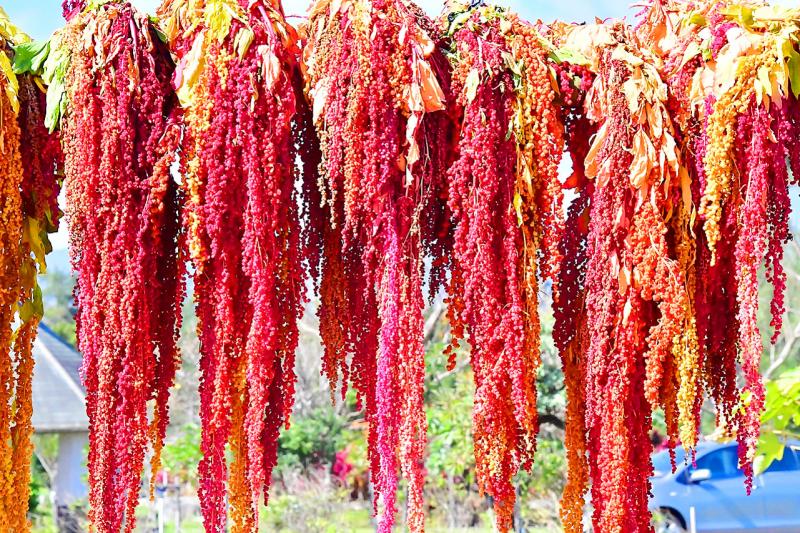Taiwan is to send plant seeds to outer space for the first time in October to observe how the space environment affects their genetic makeup, the National Space Organization (NSPO) said yesterday.
The Space Seeds for Asian Future program is being developed by the Japan Aerospace Exploration Agency. Nine nations, including Taiwan, are participating in the program this year, with 16 kinds of seeds expected to be sent to the International Space Station (ISS), where they would stay for about four months, the NSPO said.
Participating nations have primarily chosen the seeds of endemic plants or plants with symbolic meaning, it said, adding that some are crop seeds.

Photo: Chen Hsien-i, Taipei Times
The NSPO collaborated with National Chung Hsing University’s College of Agriculture and Natural Resources and the Taiwan Agricultural Research Institute, which is overseen by the Council of Agriculture, to choose which seeds to send, it said.
The college has chosen the seeds of Formosa lambsquarters, Phalaenopsis equestris, which is a kind of “butterfly orchid” originating from Lesser Orchid Island (小蘭嶼), and sunflowers, while the institute has picked chili pepper seeds, the NSPO said.
The seeds to be sent to the ISS weigh 10g, 1g, 20g and 16g respectively, it added.
The seeds selected by the university have arrived in Japan and are expected to be sent to the US next month, the NSPO said, adding that they would be returned to Taiwan in February next year.
The university is to plant the seeds following their return and observe how factors such as microgravity and space radiation affect their growth, it said.
Experts chose which seeds to send following multiple meetings with academics specializing in plants after assessing factors such as contribution to teaching and research, and weight limits for space travel, college dean Chan Fu-chih (詹富智) said.
As Japan and the US have different regulations regarding the importation of seeds, lengthy preparations had to be made, such as filling out forms on the quarantine of imported and exported seeds, as well as advance virus tests on them, Chan said.
Formosa lambsquarters, also endemic to Taiwan, is a traditional crop grown by Aborigines, but little research has been dedicated to it, while sunflower is a common plant, making it a convenient target for observation and research, she said.
Thailand and Australia have picked the seeds of their national flowers, the ratchaphruek and the golden wattle respectively; New Zealand is sending the seeds of the pohutukawa, an endemic plant; Indonesia is sending celery and onion seeds; and Malaysia the seed of holy basil, the NSPO said.

AIR SUPPORT: The Ministry of National Defense thanked the US for the delivery, adding that it was an indicator of the White House’s commitment to the Taiwan Relations Act Deputy Minister of National Defense Po Horng-huei (柏鴻輝) and Representative to the US Alexander Yui on Friday attended a delivery ceremony for the first of Taiwan’s long-awaited 66 F-16C/D Block 70 jets at a Lockheed Martin Corp factory in Greenville, South Carolina. “We are so proud to be the global home of the F-16 and to support Taiwan’s air defense capabilities,” US Representative William Timmons wrote on X, alongside a photograph of Taiwanese and US officials at the event. The F-16C/D Block 70 jets Taiwan ordered have the same capabilities as aircraft that had been upgraded to F-16Vs. The batch of Lockheed Martin

GRIDLOCK: The National Fire Agency’s Special Search and Rescue team is on standby to travel to the countries to help out with the rescue effort A powerful earthquake rocked Myanmar and neighboring Thailand yesterday, killing at least three people in Bangkok and burying dozens when a high-rise building under construction collapsed. Footage shared on social media from Myanmar’s second-largest city showed widespread destruction, raising fears that many were trapped under the rubble or killed. The magnitude 7.7 earthquake, with an epicenter near Mandalay in Myanmar, struck at midday and was followed by a strong magnitude 6.4 aftershock. The extent of death, injury and destruction — especially in Myanmar, which is embroiled in a civil war and where information is tightly controlled at the best of times —

China's military today said it began joint army, navy and rocket force exercises around Taiwan to "serve as a stern warning and powerful deterrent against Taiwanese independence," calling President William Lai (賴清德) a "parasite." The exercises come after Lai called Beijing a "foreign hostile force" last month. More than 10 Chinese military ships approached close to Taiwan's 24 nautical mile (44.4km) contiguous zone this morning and Taiwan sent its own warships to respond, two senior Taiwanese officials said. Taiwan has not yet detected any live fire by the Chinese military so far, one of the officials said. The drills took place after US Secretary

THUGGISH BEHAVIOR: Encouraging people to report independence supporters is another intimidation tactic that threatens cross-strait peace, the state department said China setting up an online system for reporting “Taiwanese independence” advocates is an “irresponsible and reprehensible” act, a US government spokesperson said on Friday. “China’s call for private individuals to report on alleged ‘persecution or suppression’ by supposed ‘Taiwan independence henchmen and accomplices’ is irresponsible and reprehensible,” an unnamed US Department of State spokesperson told the Central News Agency in an e-mail. The move is part of Beijing’s “intimidation campaign” against Taiwan and its supporters, and is “threatening free speech around the world, destabilizing the Indo-Pacific region, and deliberately eroding the cross-strait status quo,” the spokesperson said. The Chinese Communist Party’s “threats